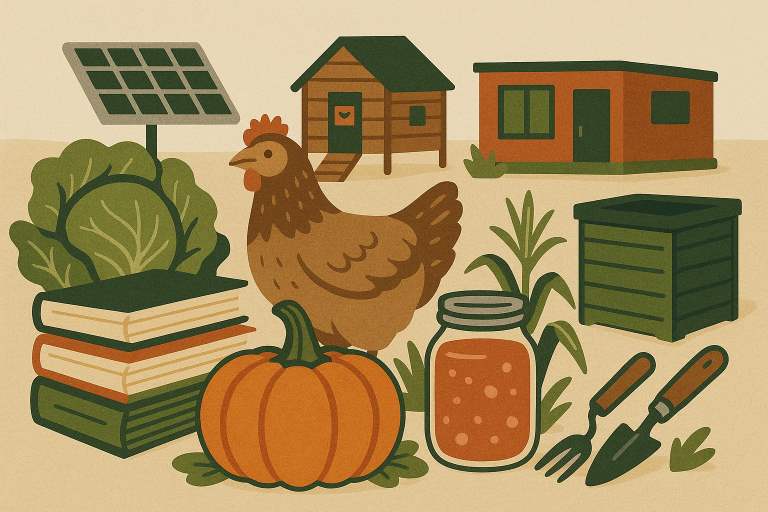How To Start A Farm Profitably and Sustainably
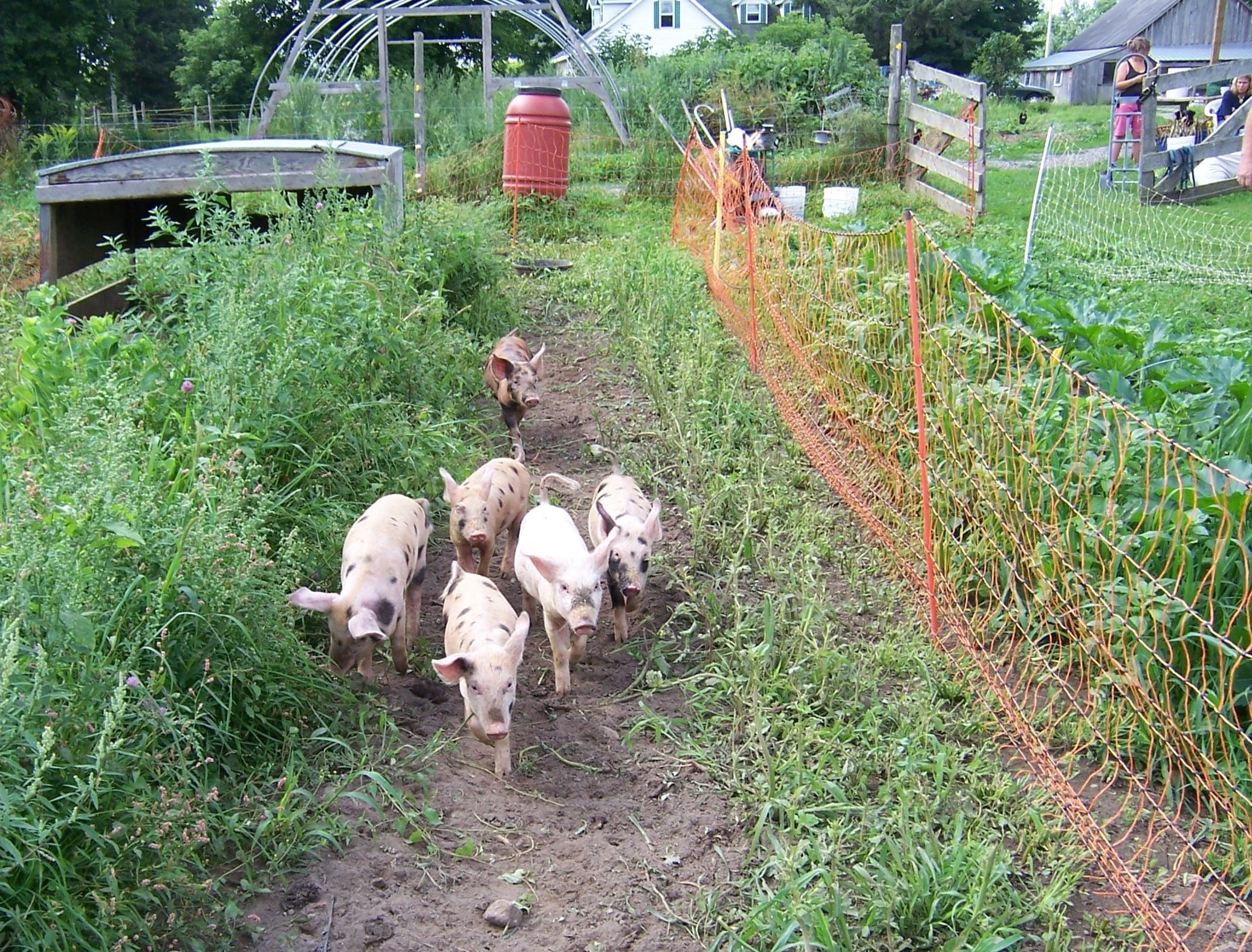 Pigs patrolling by the garden
Pigs patrolling by the gardenLet’s say you have a piece of land, and there are no legal or zoning issues that will stop you from starting a farm. Now what?
Well, notice the headline says, “How to Start a Farm Profitably and Sustainably”. This means your approach needs to more holistic than mechanical.
I believe you need to start with an understanding of three things:
1- what you WANT to grow;
2 – what you CAN grow; and
3 – where and to whom can you SELL what you grow to make a profit.
In other words your personal preferences, your skill sets and your market will determine what you should grow. Then you figure out HOW to grow it.
Answering those three questions will take some work. When Suzie and I were figuring out what we wanted to grow at New Terra Farm, we started by figuring out what we DIDN’T want to grow.
We didn’t want to grow anything on a ‘commodity’ basis i.e. selling into a vast and unknowable market.
We didn’t want to grow anything that would degrade or harm our land. We were living here for the long haul and raising our kids. Any farm product that created an environmental hazard was out.
We DID want to be able to start small, and expand as our skills and resources grew. This is how you manage risk in a new enterprise and where the expression ‘Don’t bet the farm’ comes from.
And we didn’t want to grow
confinement anything. We believed in providing for farm animal welfare to the
best of our ability. You can see in the picture our happy piggies roaming around in their pen next to the market garden.
So How Did We Start Our Farm?
Figuring out what we could grow meant an evaluation of our environment, our resources and our skill sets.
We were living in an area with about a 150-day frost free growing season.
We had some really good class-one farm land in our closest field.
We had a couple big barns and a good water supply. We had an outbuilding with power and concrete floors.
We had some experience growing a garden and when I was a kid my dad raised some pigs, chickens and sheep on our 20-acre farm.
And we had raised meat birds for our own freezer. So we weren’t totally clueless about farm growing.
Some valuable skills were less obvious. Suzie was an expert organizer, having spent a decade as an operations manager.
I was a planner, business writer and also trained as a computer programmer.
These skill sets became important when figuring out planning, marketing and management of farm operations, and setting up a farm website to advertise our farm.
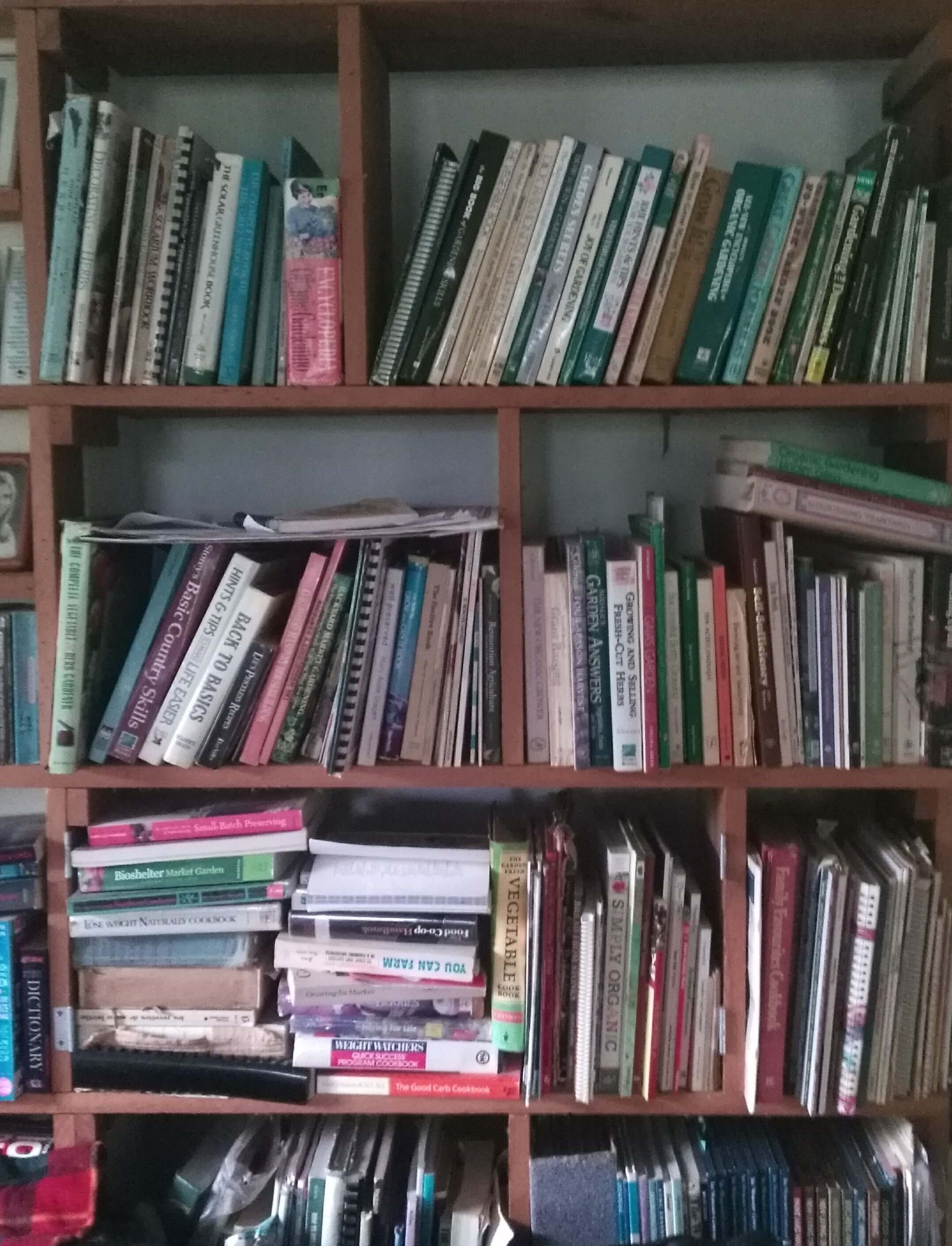 My 'How to start a farm' library
My 'How to start a farm' libraryCarefully Curated Resources For The Homesteader and Prudent Property Owner
The world seems to be a little unsettled these days. I'm always looking for ways to make New Terra Farm more self-sufficient and productive.
Here's a few of the best ways I've found to make self-sufficiency happen. Useful Homesteader Resources
We also ‘borrowed’ the knowledge of more experienced farmers. Over the years we had accumulated quite an extensive farm library, beginning even before we bought our farm.
Answering the questions of WHERE and to WHOM we could sell our farm goodies took a bit of research. We found a couple successful farmer’s markets in communities within a 20-minute drive of our farm.
One of those communities was rapidly growing, with lots of young families, because a major highway extension had just been completed connecting the community to a city of more than 1 million people. Lots of folks in the small town were commuting to the big city for work.
So young families, making good money, and perhaps not a lot of time or space for a garden of their own. A ripe market!
Putting all that together, we were pretty confident we could launch a mixed organic farm, integrating our small livestock with the market garden operation.
Our research suggested that Community Supported Agriculture (CSA) was a successful marketing model for the small farmer, so the New Terra Farm CSA Market Garden was launched in 2006.
We made up some fliers and mailed them to a few promising-looking neighbourhoods in that booming small town. We had a good response and signed up 16 families that first year for our market garden basket.
Bonus, all our pastured pork and chicken was sold to CSA customers as well. Basically everything was sold before we grew it, and the advance payments helped us with start-up costs.
Speaking of Start-up Costs...
Whatever your farm venture you will need a way to pay for start-up and on-going expenses until your farm produced revenue. Start-up costs will include whatever supplies, equipment and infrastructure you need to launch your business. You will need a budget and sufficient reserves to carry you through until that first payday.
We were lucky in that my consulting allowed me a lot of flexibility to be working in the garden when needed. It’s very possible to start a part-time farm and hold an off-farm job.
And of course because we took payments in advance for our CSA, didn’t have a cashflow problem.
Manage Risk - Start Small
No matter what you finally choose to grow, my advice is to start small. We could have sold more CSA shares in Year One, but we decided to put those extra people on a waiting list for the next season. We wanted to under promise and over deliver, not the other way around.
This also kept our start-up costs low, as we didn’t need to buy a lot of equipment to get started. I owned a rototiller already. We used a simple light stand in the living room to start transplants. My regular car, a 4-door hatchback was our delivery vehicle. We did buy plastic mulch and row cover to protect from early frosts and insect pests.
If you raise livestock, I recommend you don’t start with breeding stock. Buy day-old chicks, or weaned piglets, lambs or a calf. Keeping breeding stock year-round is a much bigger investment in time and money that just raising young animals to market weight.
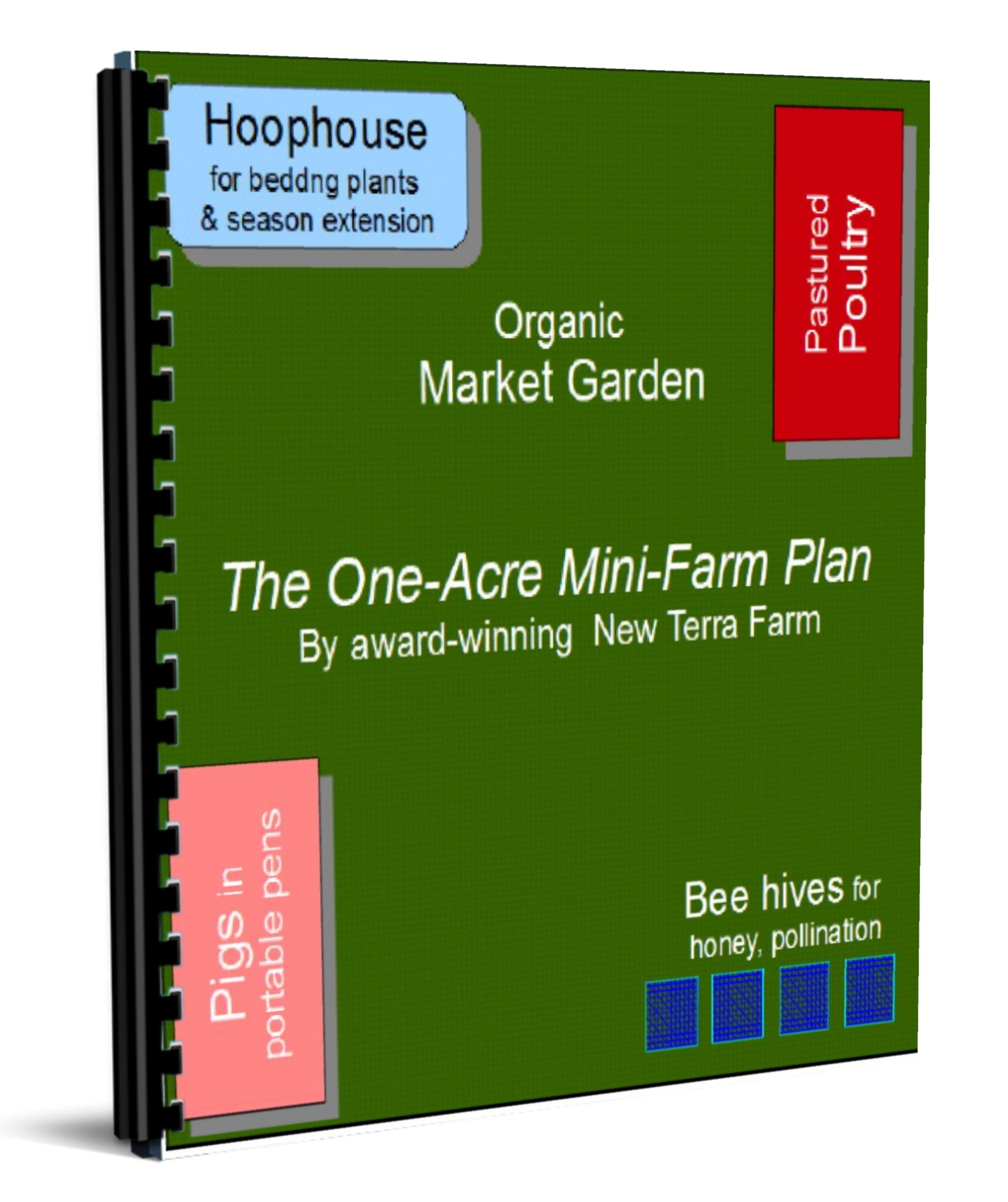
Get my FREE One-Acre Farm Plan and learn how to raise pigs, chickens and more, integrated with an organic market garden, to
make more money from your small property.
Imagine building a profitable and sustainable mini-farm even on a small piece of land. Enter you email in the form below.
More About That 'Profitably and Sustainably' bit
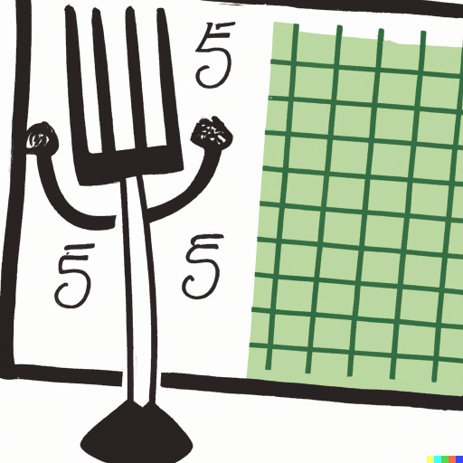 Pitchforks and Spreadsheets - the life of the modern small farmer
Pitchforks and Spreadsheets - the life of the modern small farmerThe environmental sustainability part of your farm operation is largely taken care of by a good rotation plan for your garden and your small livestock. We use our pigs and chickens to both prepare garden areas and to clean up after the harvest.
In other words where our piggies live THIS year is where our garden will be NEXT year. This has worked for us for any years; we never have a sick animal and our soil just keeps getting better.
About financial sustainability (also known as profitability): as a small farmer you will wear many hats.
You are the Chief Executive Officer, Chief Operations Officer, Chief Financial Officer, Director of Marketing Department, Head of Research and Development, and the Customer Service rep.
Your profitability depends on good management of these roles; good management depends on good record-keeping. And you need to set that up from the start.
In addition to preparing financial statements, tax returns, and other business documents, accurate and up-to-date records are necessary to make business decisions about the market garden and inform future expansion.
Get professional advice from your account and lawyer, but here's a starting list of records you will need.
Financial Records:
Income and expenses, receipts, invoices, bank statements, loan
statements, and any other financial documents.
Production Records: Seed starting and planting records, crop yields, labour hours, weather conditions,
and any other production-related data.
Inventory Records: This includes keeping track of
the amount of seeds, fertilizers, pesticides, animal feed, and other supplies
you have on hand.
Sales Records: This includes keeping track of customer orders, invoices, and receipts.
Employee Records: Employee hours,
wages, other relevant employee information.
Regulatory Records: You will want to keep track of any permits, licenses, or certifications required for your operation. This will include any inspections, audits, or other regulatory compliance activities.
How to Start a Farm - The Wrap-up
Starting on the path to become a farmer is not just a business decision; it's a lifestyle choice. Every decision you make going forward will have to be evaluated with that in mind.
I can tell you it was definitely the right choice for me; the farm has become not only a source of livelihood but also a source of great psychic satisfaction as I look at the little ecosystem we have created.
May your fields be
fertile, and your harvests abundant as you cultivate your own
farm dream.
Other 'How to Start a Farm' Resources
SARE - How to Begin Your Small Farm Dream
Beginning Farmers - Starting a Farm
And of course my own Complete Start Farming Pack, only from New Terra Farm
- Home
- How to Start a Farm
Recent Articles
-
Farm grown reviews of products recommended by New Terra Farm
Dec 04, 25 06:26 AM
Find great farm and garden products in my farm grown reviews -
Best Chicken Coop and Accessories for Small Farms and Homesteads
Nov 30, 25 09:18 AM
Looking for the best chicken coop? Here are the top coops, accessories, nest boxes, and gear to build a safe, productive poultry setup. -
Community Supported Agriculture Marketing Ideas To Sell Out The Season
Nov 05, 25 05:18 AM
Authentic Community Supported Agriculture marketing ideas to grow loyalty, boost sign-ups, and sell out your CSA every year
